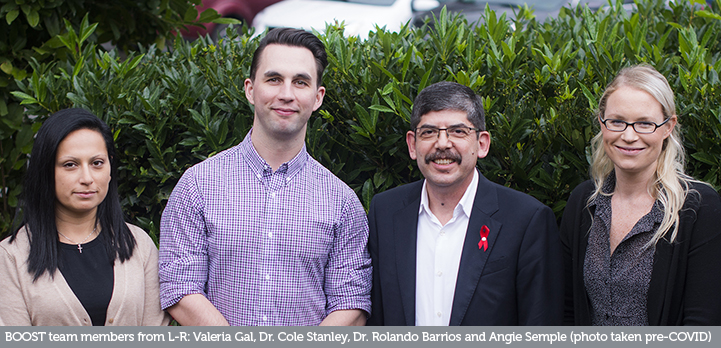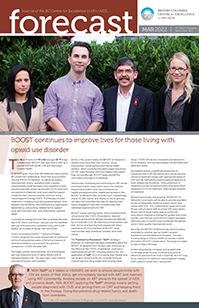
The BC Centre for Excellence in HIV/AIDS’ (BC-CfE) QI team, led by Senior Medical Director Dr. Rolando Barrios, launched the Best-Practices in Oral Opioid agoniSt Therapy Collaborative (BOOST) in 2017 as a partnership between the BC-CfE and Vancouver Coastal Health.
As BOOST grew, more than 40 healthcare teams across BC joined the Collaborative, which has since evolved into the BOOST QI Network. QI stands for quality improvement, and by operating under a quality improvement model the teams work together to help people living with opioid use disorder (OUD) overcome any barriers to treatment, and to provide the support needed to start, and consistently continue, using Opioid Agonist Therapy (OAT). This therapy provides treatments including prescribing buprenorphine, Slow Release Oral Morphine, and methadone to treat opioid dependency, reduce drug-related harms, support long-term recovery, and, most importantly, prevents death.
Currently, an average of more than six people die every day in BC due to overdoses. Last year was the deadliest year yet of this province’s overdose crisis, with 2,224 deaths, an increase of 26 per cent from 2020.
It was back in the Spring of 2016 when overdoses due to illicit drugs became the leading cause of unnatural deaths in BC. This was when the province declared a public health emergency that continues to be in place. Since the start of the official public health emergency, there’s been more than 8,800 overdose deaths.
In fact, according to the B.C. Centre for Disease Control, drug toxicity comes second only to cancers in terms of total potential years of life lost (a measure of premature death) in our province. As a point of comparison, COVID-19 ranks 12th.
The highly-potent opioid fentanyl, and its analogues, are now noted as a factor in about 84 per cent of overdose deaths in BC. Ten years ago, it was noted in only about five per cent of deaths.
As this is the current reality, the BOOST QI Network is needed now more than ever. Doctors, nurse practitioners, social workers and mental health workers, which comprise the teams supporting those on OAT, need the latest and most helpful information they can possibly get. BOOST helps provide this information through its QI Network.
The process of initiating and continuing on OAT can be overwhelming for many clients due to the need for frequent prescription pick-ups and follow-up healthcare appointments. Healthcare workers in the BOOST QI Network often provide much-needed daily check-ins with clients, and, thanks to the QI process, can learn the most effective ways for keeping their clients engaged in care and consistent with their individual requirements for OAT.
BOOST’s many learning events, which transitioned to virtual due to the COVID-19 pandemic, featured personal stories told by families and persons affected by or living with OUD. By listening to these families and their stories, and learning from people with direct experience of OUD, members of BOOST could improve their daily workflows to better serve their clients.
The TasP strategy’s emphasis on treatment has been embedded within the BOOST QI Network from the very start. And now, as the effects of the COVID-19 pandemic continue to significantly worsen BC’s ongoing opioid crisis, the application of TasP to OUD is saving lives. People who use drugs in all parts of BC are currently facing an increasingly toxic drug supply when buying street drugs. COVID-19 has also increased unemployment, social isolation, and has exacerbated mental health and addiction issues.
As evidence shows, a significant proportion of individuals with OUD will reduce illicit opioid use and remain in treatment longer with appropriate doses of OAT such as methadone, buprenorphine/naloxone or slow-release oral morphine. Other predictors of treatment success include a shorter time period from diagnosis of OUD to treatment, and a longer duration of treatment.
By learning through, and growing, the BOOST QI Network, more teams will be able to provide equitable access to integrated, evidence-based care to help clients with OUD. The Collaborative’s goals are to see 95 per cent of clients with an active OAT prescription, 95 per cent of those clients with an active OAT prescription retained on therapy for greater than three months, and 100 per cent of BOOST teams equipped with a process to monitor and incorporate the patient voice in their quality improvement work.
Recently, the BOOST QI Network has had its funding extended for another year by Health Canada’s Substance Use and Addictions Program. The new funding will go to Interior Health for a project called the Interior BOOST Collaborative. This project is slated to start in May of this year.
As illicit drug toxicity increases, and as death tolls continually break records, continuing any and all efforts to save lives from OUD is essential. BOOST’s key focus, retention of clients on Opioid Agonist Therapy (OAT), plays a critical role in saving lives.

